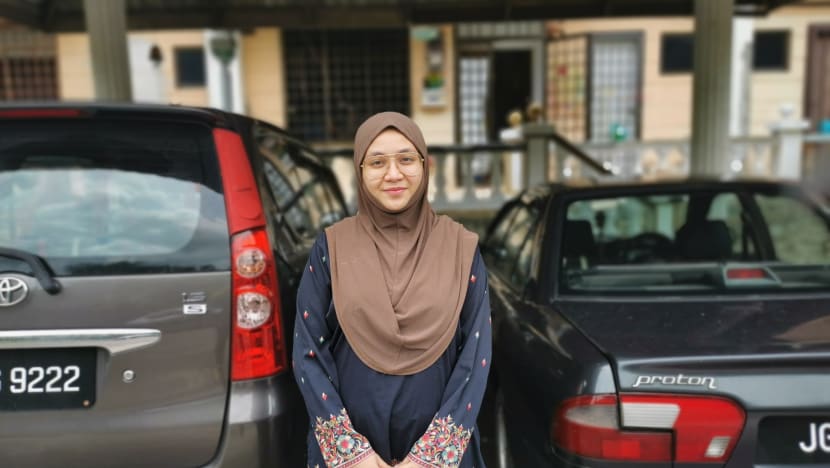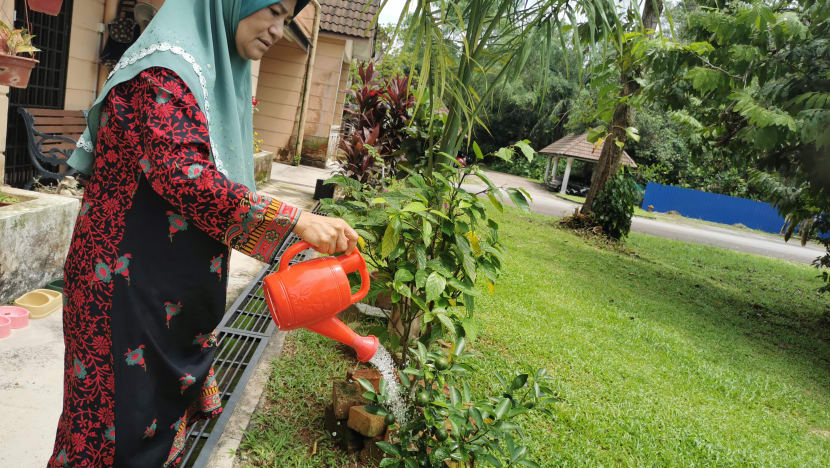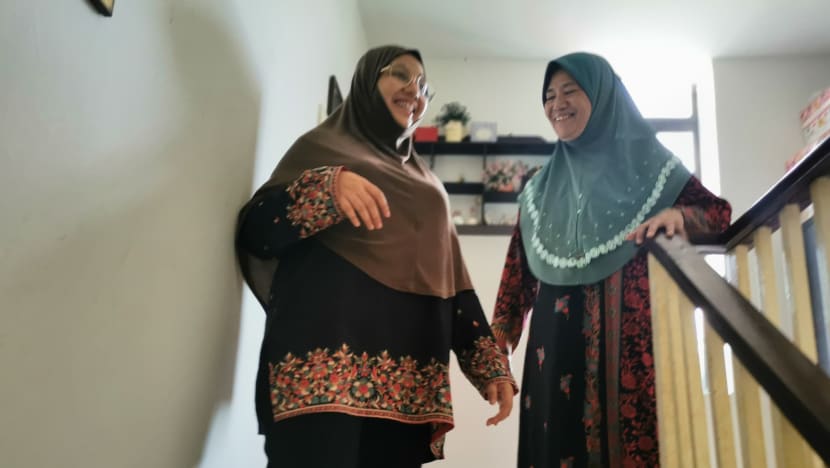Putting dreams on hold: Young Singaporean relocates to JB to care for grandparents as COVID-19 shuts border
This Hari Raya will be a quiet one for Iman Nurhannah Mohamed Fariq and her grandparents, who are apart from the rest of their family due to COVID-19 travel restrictions.

Iman Nurhannah Mohamed Fariq puts her studies and career on hold to care for her grandparents in Johor Bahru. (Photo: Amir Yusof)
JOHOR BAHRU: For Iman Nurhannah Mohamed Fariq and her grandparents, who are living in a rented condominium unit in Johor Bahru, this year’s Hari Raya Puasa will not feel right.
There will be no family members sitting around the veranda sharing ketupat and lodeh. No hugging and seeking forgiveness from one another. No posing for family photos in matching attire.
Amer Amat and Rahmah Zainolabidin are Singapore citizens who have been living in Johor Bahru for most of their lives. When the movement control order (MCO) was first declared in March 2020, they decided to stay on as they could not move all their belongings in time.
Moreover, Amer, who had just suffered a stroke, was in no condition to travel.
Iman Nurhannah, 22, was in the first year of a business and management course at the Institute of Technical Education in Singapore. She dropped everything and went over to Johor to care for her grandparents.
“I moved over because I was worried how grandma and grandfather will cope. My mother and siblings all had other obligations, and I felt that it was easiest for me to go,” said Iman Nurhannah when interviewed by CNA.
“I was putting my career and dreams on hold. But I felt (caring for my grandparents) was important too,” she added.
Before the pandemic, she would only visit during the weekends, when she had no classes. Now, she is the pillar of the household.
“I’m thankful for what she has done,” said Rahmah. "I know that deep down she wants to go home, but her mother won’t allow it because she wants her to take care of us,” said Rahmah.
READ: No 'festive vibes': Malaysians brace for another sombre Hari Raya amid nationwide COVID-19 lockdown
CHALLENGES IN HEALTHCARE, EXPENSES AS BORDER STAYS SHUT
The past 14 months has been a trying time for the trio.
“We try not to go out if we can help it. Unless it's for groceries or medicine for grandpa, we don’t leave the house ... We are here hanging on, hoping to stay safe and healthy,” said Iman Nurhannah.
Rahmah recalled the day when her husband was hit by a sudden stroke when he was sleeping at his home in Skudai. “He was taking a nap on his bed and he suddenly fell off the side. He called for me but when I came, he was no longer able to raise his hand or move his limbs. This was later diagnosed as a mild stroke by the general practitioner doctor we visited.”
Amer has treatment once a week. “A physiotherapist would come and work with him. But if we don’t have enough money, we will ask the physio to come once a month instead,” said Iman Nurhannah.
Rahmah explained that as all three of them were not working, they are dependent on her daughter (Iman Nurhannah’s mother) and a younger son to support them. Both are working in Singapore.
“They give us some money to pay our rent and utilities, but we don’t want to overburden them too much,” said Rahmah.
Ideally, the family would like to return to Singapore. “Once we are in Singapore, we can seek treatment and financial help from the government agencies because we are citizens,” Iman Nurulhannah noted.
While there are legal provisions for them to return to Singapore via the land checkpoints, they are unable to afford the ambulance costs needed to transport Amer across the Causeway as well as quarantine costs for all three of them.

Iman Nurulhannah said: “For us to head back, it will cost around S$2,000 to charter a private ambulance for us to go across the Causeway. Then there are also quarantine costs."
"Now with the 21-day quarantine imposed for those coming from Malaysia, it could cost us up to S$3,000 per person. That’s more than S$10,000 for just one trip, we simply cannot afford it.”
Given the costs involved, they have decided to stay put for now. But the situation is complicated by their immigration status.
Last month, Malaysia said those who were holding expired social visit passes and stranded due to the MCO were required to leave the country by Apr 21 or risk being penalised.
However, Malaysia's Immigration Department director-general Khairul Dzaimee Daud said foreigners who were unable to leave the country by Apr 21 may apply for a special pass to extend their stay.
The three of them have appealed to extend their social visit passes with Malaysia’s Immigration Department but they have been unsuccessful so far.
“We appealed on the basis of a doctor’s letter saying that my grandfather is not fit to travel, in the hope that the immigration authorities can show some compassion and grant us an extension,” said Iman Nurulhannah.
READ: Malaysia to be placed under another nationwide MCO from May 12: PM Muhyiddin
“A SAD AND QUIET HARI RAYA”
Rahmah said for the festival later this week, the trio would just “sit at home quietly”.
“Every (Hari) Raya, it’s a tradition for all of us, my siblings and my mother, to come here for our last breaking fast during Ramadan. Then we would welcome Hari Raya together, cook festive food and just celebrate the occasion. But this year, it will be a sad and quiet Hari Raya because it’s just us three.”
She added: “We won’t even cook the usual Hari Raya dishes because it’ll be wasting food. What’s worse, Amer’s condition is such that he can’t even walk and eat solid food, so we are in no mood to be festive.”

Despite the subdued mood, both granddaughter and grandmother said they are blessed.
“Hari Raya is about family. The situation this year is far from ideal, but it serves as a reminder to be grateful that the three of us are here together, supporting one another,” said Rahmah.
Looking ahead, Iman Nurulhannah said that she would prefer to return to Singapore to resume her studies and work to help her family financially.
“My plan is to go back to Singapore, work full time and when I have enough, around S$8,000, enrol into a diploma course on food and beverage supervision at the Singapore Hotel and Tourism Education Centre (SHATEC),” she said.
“I’m praying that the border reopens so my mother and I can straddle between working and taking care of grandma and grandpa,” she added.












